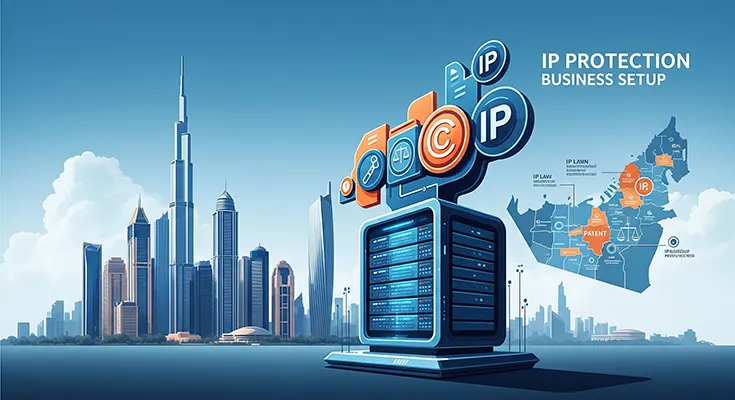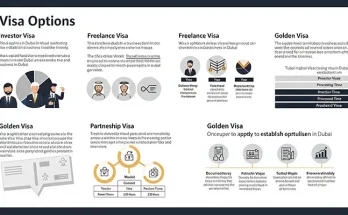Key Takeaways:
- The UAE has a strong and evolving legal framework for Intellectual Property (IP) protection, aligning with international standards.
- Key IP assets to protect include trademarks, copyrights, patents, industrial designs, and trade secrets.
- Registration with the Ministry of Economy is crucial for trademarks, patents, and industrial designs, and highly recommended for copyrights.
- 100% foreign ownership is largely permitted for IP-holding companies in both mainland Dubai and its free zones.
- Strategic planning for IP protection should be an integral part of your Business setup in Dubai from the very beginning.
In today’s global economy, intellectual property (IP) is often a business’s most valuable asset. From brand names and logos to innovative technologies and creative works, safeguarding these intangible assets is crucial for sustained success and competitive advantage. Dubai, with its vision to be a knowledge-based economy and a hub for innovation, has significantly strengthened its IP protection framework. For any Business setup in Dubai, understanding and implementing robust IP protection strategies is not just advisable; it’s essential. This involves knowing the types of IP, the registration processes, and how your chosen business setup jurisdiction impacts your IP rights.
Why Prioritize IP Protection for Business setup in Dubai?
Investing in IP protection is not merely a legal formality; it’s a strategic imperative for any Business setup in Dubai. Here’s why it holds significant importance:
- Safeguarding Competitive Advantage:
- Your unique brand identity (trademarks), novel inventions (patents), original content (copyrights), and confidential business information (trade secrets) are what differentiate you from competitors. Protecting these assets legally prevents others from copying, imitating, or exploiting your innovations, thereby preserving your market position and profitability.
- In a dynamic market like Dubai, where innovation is highly valued, strong IP rights ensure your business can thrive without fear of dilution or theft.
- Attracting Investment and Enhancing Valuation:
- Investors, particularly in the tech and creative sectors, keenly evaluate a company’s IP portfolio. A well-protected suite of trademarks, patents, and copyrights signals a de-risked and valuable asset base, making your Business setup in Dubai more attractive for funding and acquisition.
- IP assets can be licensed, mortgaged, or used as collateral, adding tangible value to your company’s balance sheet.
- Combating Counterfeiting and Infringement:
- Dubai is a major global trading hub. Unfortunately, this can also make it a target for counterfeit goods and IP infringement. Robust IP registration provides the legal tools necessary to take action against infringers.
- Customs authorities, the Department of Economic Development (DED), and the Ministry of Economy actively work to enforce IP rights, conducting raids and seizures of counterfeit products, especially when legitimate IP is registered.
- Facilitating Licensing and Franchising Opportunities:
- If your Business setup in Dubai aims to expand through licensing your technology, brand, or creative content, strong IP protection is foundational. It provides clarity on ownership and allows for secure, legally binding agreements for others to use your IP in exchange for royalties or fees.
- This is particularly relevant for international expansion or for businesses operating in sectors like fashion, media, F&B, or technology.
- Compliance with International Standards:
- The UAE is a signatory to key international IP treaties, including the Madrid Protocol (for trademarks), the Patent Cooperation Treaty (PCT), and the Berne Convention (for copyrights). This alignment with global standards facilitates easier IP protection for businesses with international operations and enhances cross-border enforcement.
- It assures foreign investors that their IP will be recognized and protected under a familiar legal framework.
By prioritizing IP protection from the outset of your Business setup in Dubai, you are not just complying with regulations but actively building a stronger, more resilient, and more valuable enterprise in a competitive global landscape.
Types of Intellectual Property and Registration in Dubai
For a successful IP protection Business setup in Dubai, it’s crucial to understand the different forms of intellectual property and their respective registration processes, primarily overseen by the UAE Ministry of Economy.
- Trademarks:
- What it protects: Any distinctive sign – including names, words, logos, symbols, colors, sounds, or even smells – used to identify and distinguish goods or services of one business from those of others. Your brand name, product name, and logo are key trademarks.
- Governing Law: Federal Decree-Law No. 36 of 2021 on Trademarks.
- Registration Process:
- Trademark Search: Highly recommended to check for existing similar marks.
- Application Submission: File an application with the UAE Ministry of Economy, specifying the goods and services categories (using Nice Classification). Foreign applicants generally must use a registered trademark agent.
- Examination: The Ministry examines the application for distinctiveness and similarity to existing marks.
- Publication: If approved, the trademark is published in the Official Trademark Gazette. There is a 30-day opposition period for third parties.
- Registration & Certificate: If no opposition or if opposition is successfully overcome, the trademark is registered, and a certificate is issued.
- Duration: Valid for 10 years from the filing date and is renewable indefinitely for similar periods.
- Enforcement: Registered trademarks offer strong legal grounds for infringement actions, including injunctions, damages, and seizure of counterfeit goods.
- Copyrights:
- What it protects: Original literary, artistic, and scientific works, regardless of their nature, form of expression, importance, or purpose. This includes books, software, music, films, photographs, architectural designs, databases, and digital works.
- Governing Law: Federal Decree-Law No. 38 of 2021 on Copyrights and Related Rights.
- Registration Process: Copyright protection automatically arises upon creation of the work. However, registration with the Ministry of Economy’s Copyright Department is highly recommended as it provides strong evidence of ownership in case of disputes.
- Application: Submit an application with a copy of the work, description, and proof of ownership.
- Duration: Generally, the author’s lifetime plus 50 years after their death.
- Enforcement: Rights holders can pursue legal action for unauthorized reproduction, distribution, public performance, or adaptation of their work.
- Patents:
- What it protects: New, inventive, and industrially applicable inventions in all fields of technology. This covers new products, processes, or improvements to existing ones.
- Governing Law: Federal Decree-Law No. 11 of 2021 on the Regulation and Protection of Industrial Property Rights.
- Registration Process:
- Filing: File an application with the International Centre for Patent Registration (ICPR) under the Ministry of Economy.
- Formal & Substantive Examination: The application undergoes a formal check and then a detailed substantive examination to determine novelty, inventive step, and industrial applicability.
- Grant: If all conditions are met, the patent is granted. The UAE is also a member of the Patent Cooperation Treaty (PCT), allowing international protection.
- Duration: 20 years from the filing date, subject to annual maintenance fees.
- Exclusions: Certain inventions like diagnostic methods, surgical treatments, scientific principles, and business methods (as abstract concepts) are generally not patentable.
- Industrial Designs:
- What it protects: The aesthetic or ornamental aspect of an article, which gives it a new and distinctive appearance. This applies to the shape, pattern, or color configurations of a product (e.g., the design of a phone, furniture, or a textile pattern).
- Governing Law: Federal Decree-Law No. 11 of 2021 on Industrial Property Rights.
- Registration Process: File an application with the Ministry of Economy, including drawings/representations and a description of the design.
- Duration: Up to 10 years (or sometimes 20 years for certain categories), subject to renewal fees.
- Trade Secrets:
- What it protects: Confidential business information that provides a competitive edge (e.g., proprietary formulas, manufacturing processes, customer lists, business strategies). Unlike other IP, trade secrets rely on secrecy, not registration.
- Governing Law: Protected under various laws, including the Commercial Transactions Law and the Penal Code, as well as Federal Decree Law No. 11 of 2021 as “Undisclosed Information.”
- Protection: Requires proactive measures like Non-Disclosure Agreements (NDAs), strict internal controls, and confidentiality clauses in employment contracts.
For any Business setup in Dubai looking to safeguard its innovations, seeking advice from an IP legal expert or a business setup consultant experienced in IP is highly recommended to ensure proper classification and registration.
Mainland vs. Free Zone for IP Protection in Business setup in Dubai
The choice of jurisdiction for your Business setup in Dubai—mainland or free zone—does not fundamentally alter the underlying UAE IP laws or the registration process with the Ministry of Economy. Both types of entities register their IP centrally. However, there are nuances to consider regarding market access, enforcement, and operational focus.
- Mainland IP Holding and Enforcement:
- Market Access: A mainland company (licensed by the Department of Economy and Tourism – DET) has unrestricted access to the entire UAE local market. This is critical if your primary business involves selling IP-protected goods or services directly to consumers or businesses across all of Dubai and the wider Emirates. For instance, a brand selling trademarked products in retail outlets across Dubai would find a mainland setup more direct.
- 100% Foreign Ownership: Recent changes mean 100% foreign ownership is now widely permitted for commercial and professional activities on the mainland, including those that primarily involve holding or exploiting IP. This simplifies the ownership structure for foreign investors.
- Enforcement: Mainland companies can directly file complaints with the Department of Economic Development (DED) for market-related IP infringements, engage with Dubai Customs for border protection against counterfeits, and pursue civil or criminal actions through local courts. The DED often conducts market raids based on registered IP.
- Benefits: Full access to the UAE consumer base, direct involvement in local enforcement actions, and a more straightforward path for traditional retail or service-based businesses.
- Considerations: Mainland companies are subject to the UAE Corporate Tax (9% on profits exceeding AED 375,000). While beneficial for market access, physical office requirements can be more stringent depending on the business activity.
- Free Zone IP Holding and Enforcement:
- Specialized Free Zones: Many free zones, such as Dubai Internet City (DIC) for tech, Dubai Media City (DMC) for media, and even SPC Free Zone in Dubai for publishing and broader commercial activities, are designed to create industry clusters. While IP laws are federal, these zones often have their own intellectual property regulations that complement the federal laws, sometimes offering specialized arbitration or dispute resolution mechanisms within the free zone authority.
- 100% Foreign Ownership & Tax Benefits: Free zones continue to offer 100% foreign ownership, 0% corporate tax on qualifying income, and full repatriation of profits. These benefits are particularly attractive for IP-intensive businesses whose primary revenue streams are international or derived from licensing/franchising models.
- Market Access (Free Zones): While IP registration is central, a free zone entity’s ability to directly sell IP-protected goods or services on the UAE mainland is generally restricted. For mainland operations, a free zone company might need to set up a mainland branch or engage a local distributor, which can add complexity.
- Suitability of SPC Free Zone in Dubai:SPC Free Zone in Dubai, while historically focused on publishing, offers a wide array of commercial and professional licenses suitable for various IP-centric businesses. For example, a company focused on:
- Copyright-heavy activities: (e.g., digital content creation, software development, media production).
- Trademark holding: For brands primarily operating online or internationally.
- Licensing/Franchising: Managing IP licenses with partners outside the UAE or with mainland branches.
- Consultancy: Offering IP advisory services.
- SPC Free Zone in Dubai provides a cost-effective setup, quick registration, and flexible office solutions, making it an attractive base for such activities, particularly if the primary market is international or online.
- Benefits: Tax efficiency, ease of setup, flexible office solutions, a dedicated business community, and often a streamlined regulatory environment for international business.
In essence, while the IP registration process remains largely centralized with the Ministry of Economy, your choice of mainland or free zone for your Business setup in Dubai impacts how your IP-driven business integrates with the local market and the operational flexibility you enjoy. For direct consumer engagement in the UAE, mainland is stronger. For international focus, licensing, or digital IP, free zones like SPC Free Zone in Dubai offer significant advantages.
Key Steps for IP Protection as Part of Business setup in Dubai
Integrating IP protection into your Business setup in Dubai from the outset is a proactive measure that safeguards your innovations and brand identity. Here are the key steps:
- Conduct a Comprehensive IP Audit and Strategy Formulation:
- Identify IP Assets: Before company registration, identify all your intellectual assets: proposed brand names, logos, software, unique product designs, proprietary processes, and creative content.
- Strategy Development: Determine which IP assets need formal registration (trademarks, patents, industrial designs), which can be protected by contract (trade secrets), and your target markets for protection (UAE, GCC, international). This audit informs your Business setup in Dubai decisions.
- Trade Name Reservation and Business License Application:
- Trade Name Search: Conduct a thorough search for your proposed company name and trademarks to ensure they are available and not infringing on existing rights. This is vital before reserving your company’s trade name with the Department of Economy and Tourism (DET) or the relevant Free Zone Authority.
- Company Registration: Proceed with your Business setup in Dubai, choosing your legal structure (LLC, FZE/FZCO) and jurisdiction (mainland or free zone like SPC Free Zone in Dubai) based on your overall business and IP strategy. Obtain your commercial or professional license. The trade license is a prerequisite for IP registration.
- Trademark Registration with the Ministry of Economy:
- Application Preparation: Prepare your trademark application, including high-resolution images of your logo, a clear description of the goods/services it will cover (using the Nice Classification system), and copies of your company’s trade license.
- Submission (via Agent): For foreign companies, it is mandatory to submit the trademark application through a registered trademark agent in the UAE.
- Examination & Publication: The Ministry of Economy will examine the application. If accepted, it will be published in the official gazette for a 30-day opposition period.
- Certificate Issuance: If no successful opposition, the trademark is registered, and you receive the official certificate. This process usually takes several months.
- Copyright, Patent, and Industrial Design Registration:
- Copyright Registration: While automatic, it is strongly advised to register your original works (software, literary works, art, music) with the Ministry of Economy’s Copyright Department. This provides undeniable proof of ownership in case of infringement.
- Patent Registration: If you have a novel, inventive, and industrially applicable invention, prepare a detailed patent application with technical specifications and drawings. This is filed with the International Centre for Patent Registration (ICPR) under the Ministry of Economy. The examination process for patents is rigorous and lengthy.
- Industrial Design Registration: For unique aesthetic designs of products, apply for industrial design registration with the Ministry of Economy, including clear representations of the design.
- Implement Trade Secret Protection Measures:
- Confidentiality Agreements: Draft and enforce robust Non-Disclosure Agreements (NDAs) with employees, contractors, and business partners who have access to your confidential information.
- Internal Policies: Implement strict internal policies and controls regarding access to and sharing of proprietary data, customer lists, and business strategies.
- Security: Utilize digital and physical security measures to protect sensitive information.
- Ongoing IP Management and Enforcement:
- Monitoring: Regularly monitor the market and online spaces for potential infringements of your registered IP.
- Enforcement: Be prepared to take legal action if infringement occurs. This may involve sending cease-and-desist letters, filing complaints with the DED or Customs, and initiating court proceedings.
- Renewal: Keep track of renewal deadlines for your trademarks, patents, and industrial designs to ensure continuous protection. Trademarks are typically renewed every 10 years, and patents have annual fees.
By systematically addressing these steps as part of your Business setup in Dubai, you build a strong foundation for protecting your intellectual assets and fostering long-term growth.




